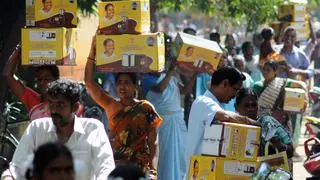Finance Minister Nirmala Sitharaman, on Thursday, came out strongly against Delhi Chief Minister Arvind Kejriwal for his deliberate obfuscation of freebies and welfare measures.
“Delhi CM has given a perverse twist to the debate on freebies. Health and education have never been called freebies. No Indian government has ever denied them,” said the FM. Sitharaman was responding to Kejriwal, who said there “seems to be something wrong with the Centre’s finances the way it is strongly opposing free education, healthcare, medicines, food.”
“Never in the past 75 years has the government taxed basic food grains. Tax over petrol and diesel is over ₹1,000 crore. They’re now saying all free things by government should end, and fees should be charged in govt schools and hospitals. They’re saying free rations to be stopped,” said the Delhi CM.
The FM said Kejriwal is indulging in fear-mongering. “Classifying education and health as freebies, Kerjiwal is trying to bring in a sense of worry and fear in minds of the poor,” she said.
Detailed explanation
Meanwhile, sources in the government came out with a detailed rebuttal on Kejriwal’s allegations. The rebuttal said the Central government, under Prime Minister Narendra Modi, is perhaps the first to give free food over and above the highly subsidised food provided to 80 crore people.
The Centre’s response to Kejriwal made a distinction between welfarism – providing for health, education and PDS system – and being fiscally imprudent by promoting schemes like free power, which the government can ill-afford.
“When they promise free electricity, water or other freebies, they are merely borrowing from future generations to reward the present one,” the source said, underlining Punjab Government’s announcement of free power up to 300 units or Delhi Government’s promise of free electricity up to 200 units.

On Kejriwal’s question about the Centre collecting ₹3.5-lakh crore a year from the tax on petrol and diesel and “where has the money gone”, another source referred to RBI data in its ‘Handbook of Indian Statistics’, where it has been shown that total developmental expenditure incurred by the Modi government in 2014-22 was ₹90.9-lakh crore, far higher than is being alleged by some sections of the Opposition. “In contrast, only ₹49.2-lakh crore was spent on this during 2004-14,” the source said.
Another allegation is about the lack of money to pay the 100 days wages of MGNREGA. And on the cut in the allocation for the scheme, sources said Kejriwal should look at the Budget documents in detail before commenting. “The fact of the matter is that the government has been flexible and has raised the allocation for MGNREGA as and when needed,” he said.
Under the Modi government, spending on MGNREGA has always been higher than what was budgeted. The allocation for MGNREGA was ₹61,500 crore in Budget 2020-21 before the pandemic. However, seeing the impact of the pandemic, this was increased to an unprecedented ₹1,11,500 crore in the Revised Estimate, of which, ₹1,11,169 crore was actually spent, a historic amount.
The next year, while ₹73,000 crore was budgeted for MGNREGA in 2021-22, this was increased to ₹98,000 crore in the RE in response to the demand. Budgetary allocation of ₹73,000 crore has been made for MGNREGA. As the scheme is demand-driven, additional allocations can be made subsequently if the need arises.
On the issue of ₹10-lakh crore of loans of their super-rich friends being waived off, the source clarified that write-offs are not waivers. Write-offs are technical requirements, as per the RBI, and the recovery process continues. “Banks have recovered over ₹8.6-lakh crore bad loans in the last eight years, on account of strong measures initiated by the government and the Reserve Bank,” he said.








Comments
Comments have to be in English, and in full sentences. They cannot be abusive or personal. Please abide by our community guidelines for posting your comments.
We have migrated to a new commenting platform. If you are already a registered user of TheHindu Businessline and logged in, you may continue to engage with our articles. If you do not have an account please register and login to post comments. Users can access their older comments by logging into their accounts on Vuukle.